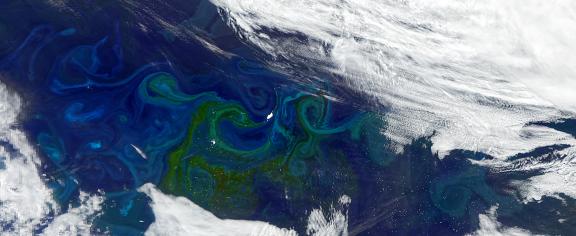2022-07-19
Researchers have developed a methodology to determine why coastal glaciers are retreating, and in turn, how much can be attributed to human-caused climate change.
2025-06-19
Ocean waters are getting greener at the poles and bluer toward the equator, according to an analysis of satellite data published in Science on June 19.
2023-10-10
With goals to boost science, engineering, and computing Ph.D. researchers from underserved populations, UCEM grows in 2023 to include students from Schools of Biological Sciences, Earth and Atmospheric Sciences, Mathematics, and Physics.
2023-12-20
The feasibility study by Georgia Tech researchers explores using conditional normalizing flows (CNFs) to convert seismic data points into usable information and observable images. This potential ability could make monitoring underground storage sites more
2021-08-05
CMDI merges disciplines, aggressively recruiting microbiologist ‘superstars’ to take back the high ground from antibiotic-resistant pathogens and emerging diseases — and to harness microbes for new medicines, cleaner environments, and climate solutions.
2023-11-16
School of Earth and Atmospheric Sciences researchers find dangerous sulfates are formed, and their particles get bigger, within the plumes of pollution belching from coal-fired power plants.
2023-09-20
The College of Sciences graduate students were chosen as 2023-24 Herbert P. Haley Fellowships for their research and academic achievements
2023-06-13
The interdisciplinary Environmental Science (ENVS) degree program, developed by faculty in the Schools of Earth and Atmospheric Sciences and Biological Sciences, is now enrolling students interested in a wide variety of environment-related careers.
2023-03-03
The Icefin robot’s unprecedented look inside a crevasse, and observations revealing more than a century of geological processes beneath the ice shelf, are detailed in a new paper in Nature Geoscience.
2023-02-09
With the Ferst Center filled to the brim Wednesday, Georgia Tech hosted Vice President Kamala Harris for a discussion about the climate crisis, which she called a transformational moment in America.


